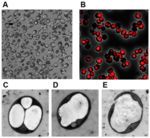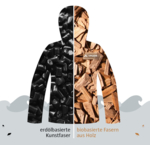-
Climate-neutral wastewater treatment plants thanks to patented real-time analytics - 08/11/2023
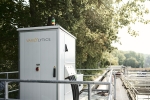
The wastewater industry is responsible for global greenhouse gas emissions equivalent to those of global aviation. The start-up Variolytics has found a way to significantly reduce greenhouse gases in wastewater treatment plants using real-time analytics. The patented sensor technology and AI-supported process optimisation offer multiple benefits: in addition to reducing nitrous oxide, the system helps to reduce energy costs and resources.
https://www.biooekonomie-bw.de/en/articles/news/using-ai-reduce-greenhouse-gases-wastewater-companies
-
-
-
-
Think Tank FYI: Agriculture 5.0 - 16/02/2023
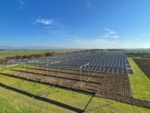
Climate protection, agriculture and biodiversity are closely intertwined. Agriculture 5.0 provides positive guidance, as the Offenburg University of Applied Sciences has demonstrated: agrophotovoltaics (or agrivoltaics), which is currently in vogue in Germany, can be used to generate solar power on high-yield fields. Biomass strips and biochar remove CO2 from the atmosphere. All this improves soil quality and promotes biodiversity.
https://www.biooekonomie-bw.de/en/articles/news/agriculture-50-fighting-climate-crisis-agrophotovoltaics-and-biochar
-
Synergistic effects with microalgae and purple bacteria - 03/02/2023
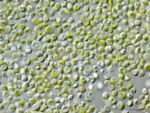
A biorefinery that uses industrial wastewater and residual material streams is being built in Rheinfelden (Baden). It will have two interlinking bioreactors and will synthesize biohydrogen as well as organic basic materials such as carotenoids and proteins. SmartBioH2-BW is a pilot project run by the Urban and Industrial Biorefineries initiative and funded by the Baden-Württemberg Ministry of the Environment, Climate Protection and Energy Sector.
https://www.biooekonomie-bw.de/en/articles/news/working-towards-hydrogen-economy-wastewater-biorefinery-smartbioh2-bw-project
-
Valorization of biological materials - 12/01/2023
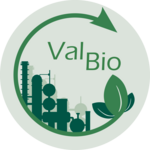
Reducing carbon dioxide emissions and the capture and utilization of CO2 are important steps towards achieving a climate-neutral and sustainable economy. Accordingly, as part of the ValBio-Urban research project, an interdisciplinary team from the University of Stuttgart is developing bioeconomic approaches to solutions that will be implemented with companies from Baden-Württemberg.
https://www.biooekonomie-bw.de/en/articles/news/valbio-urban-brings-bioeconomy-research-users
-
-
-
-
Press release - 29/09/2022
Fossil raw materials are limited and not available and extractable everywhere in the world – as we are becoming acutely aware of right now by the example of fossil fuels and rising energy prices. Renewable raw material sources will therefore play an increasingly important role in the future: as energy sources, but ideally also as suppliers of building blocks for more environmentally compatible chemicals and materials.
https://www.biooekonomie-bw.de/en/articles/pm/algen-als-mikroskopische-bioraffinerien
-
-
-
Renaturalised peatlands as carbon dioxide stores - 14/06/2022
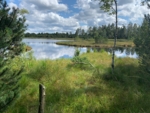
All intact peatlands on our planet store twice the amount of CO2 as all forests. Peatlands are indispensable for preventing and mitigating the effects of climate change. The only problem is that 95 percent of Germany's peatlands have been drained, and thus release around 7 percent of Germany’s total CO2 emissions into the atmosphere. Rewetting is therefore imperative for the climate, the environment and biodiversity – and economically…
https://www.biooekonomie-bw.de/en/articles/news/peatlands-climate-protection-factor-binding-co2-instead-releasing-it
-
-
Filament winding technology for sustainable construction - 06/04/2022

One of the greatest challenges in the construction industry is the transition to more environmentally friendly and resource-saving buildings. Researchers at the University of Stuttgart are combining state-of-the-art robotic filament winding technologies with ancient local crops to produce stable and sustainable lightweight structures from flax fibres.
https://www.biooekonomie-bw.de/en/articles/news/robotic-building-natural-fibres
-
-
-
Press release - 02/03/2022
The Ministry of the Environment, Climate Protection and the Energy Sector is funding the KoalAplan project, which extends the functional scope of a wastewater treatment plant. The project, based in the Stuttgart district of Büsnau, aims at recovering raw materials from wastewater and is therefore making a positive contribution to climate neutrality, as the products obtained replace fossil raw materials and energy-intensive processes.
https://www.biooekonomie-bw.de/en/articles/pm/biorefinery-project-koalaplan-extracting-raw-materials-wastewater
-
-
Press release - 13/01/2022
Making important raw materials for fine chemicals out of carbon dioxide really works. As part of the Max Planck collaborative project eBioCO2n, a team of researchers from Fraunhofer IGB have successfully performed a first ever fixation of CO2 via a multi-enzyme enzyme reaction driven by electricity yielding a prospective intermediate for the chemical industry. The process for electro-biocatalytic CO2 fixation was recently published and is…
https://www.biooekonomie-bw.de/en/articles/pm/turning-harmful-co2-useful-chemicals
-
-
Climate-friendly circular economy - 11/11/2021
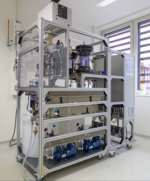
A Fraunhofer team has successfully produced a dye using CO2 adsorbed from the air. The aim is to move towards a climate- and resource-friendly circular economy. Chemicals, as well as fuels, can be produced cost-effectively using this process. How does the technical process work, and what opportunities does it open up?
https://www.biooekonomie-bw.de/en/articles/news/co2-air-raw-material-chemicals
-
Reduction of greenhouse gases in wine production - 31/08/2021

In the EU project REDWine, the CO2 produced during wine fermentation is captured and used to produce algae biomass. Novis GmbH from Tübingen supplies the complete system for CO2 utilisation. The aim of the project is to reduce the share of global warming caused by wine production in a way that is economical for producers.
https://www.biooekonomie-bw.de/en/articles/news/redwine-project-and-climate-change
-
Website address: https://www.biooekonomie-bw.de/en/search







